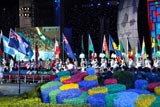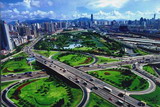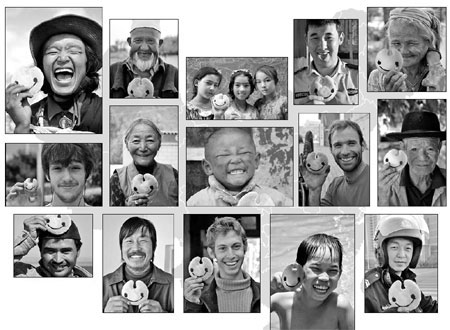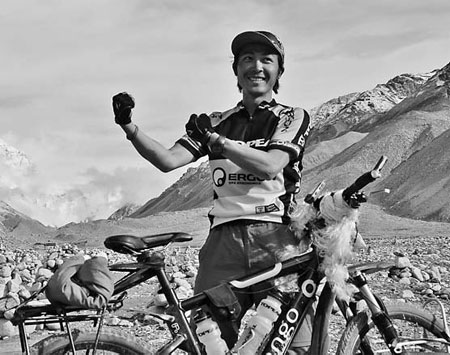Let the games begin
Updated: 2011-08-02 08:18
By Shi Yingying (China Daily)
|
Zhou Ziqian took 2,011 photos of the people he met on his grueling trip. Everyone holds a UU, the Universiade mascot. Photos Provided to China Daily |
|
Shenzhen native Zhou Ziqian poses in the Xinjiang Uygur autonomous region. |
A young graphic designer travels the country for 400 days on his bicycle to promote the upcoming 26th World University Games in Shenzhen. Shi Yingying reports.
For a little over a year, Shenzhen native Zhou Ziqian traversed the length and breadth of the country, along the border areas of 18 provinces, three municipalities and two administrative regions, on his bicycle. The 29-year-old traveled for 400 days, covered 29,230 km, averaging 80 km a day, from March 31, 2010 to May 4, 2011, his bicycle tracks outlining a beautiful rooster on the route.
Recalling the journey that he undertook to promote the 26th World University Games to be held in Shenzhen on Aug 12-23, the young graphic designer says, "I've been to southernmost Sanya, the western end of Kashgar, the northernmost county of Mohe and the eastern end of Fuyuan."
He narrates how a passer-by described him as "a refugee from a distance and a beggar up close" and says the nationwide tour was a test of both his physical and mental strength.
Zhou says his most miserable dinner was the one he had in Liaoning province on the eve of Chinese New Year.
"It was very cold and when I finally found myself a little place to stay for the night at the public bathhouse, I decided to try my luck and find somewhere to eat," he says. "But not a single restaurant in that village was open. I could not even find a small shop selling some bread.
"I finally made some instant noodles and felt so sorry for myself ," he says.
He was luckier the next day in Liaoning's Dandong, where he was invited by a motel owner for a decent "get-together meal" to celebrate the new year.
Zhou felt the burden of loneliness more than the 40 kg of supplies he was carrying, including a tent.
"I saw more Tibetan antelope than humans on the Xinjiang-Tibet Highway," he says. "It's not often that you can travel more than 100 km without meeting a single person.
"But I was never afraid of getting lost. Many people think it's easy to lose one's way in those remote villages and counties. But I think it is much easier to get lost in a city such as Beijing and Shanghai.
"How can you lose your way if there's only one way available?" he asks.
He says he was often asked why he chose a bicycle for his ambitious trip.
The sun-tanned Zhou, who took to hiking and mountaineering years ago, says it's "not the power of the engine, but the power of human beings" that amazes him and prompted him to embark on his cycling expedition.
"But it was only in 2007 that I became a cyclist," he says. That year, Zhou and his friends spent six days cycling to Gongga Mountain, the highest mountain in Sichuan province.
Among Zhou's souvenirs from his 400-day-trip are the 2,011 photos he took of the people he met.
"I took pictures of 2,011 smiling people holding a UU, the Universiade mascot," Zhou says and adds that they are of different ages, from diverse occupations and even different nationalities.
"It's their varied lifestyles that these photos reflect that impressed me most," Zhou says.
"When you spend more than a year on the road, it's very hard to relate to the lives that city people lead - they are spending their daily routines in the same spot on the map. It's only dozens of kilometers from one end of Shenzhen to another, and I passed several cities like this in one day."
Zhou says he met a 21-year-old sheep dealer in Gansu province, who was married and had a 2-year-old child. "Before I could ask him, 'Why did you get married so early?' he asked me, 'Why don't you find yourself a wife? You're already 29! You can only see your grandson when you're over 70'!'"
"This is how simple folk look at life. For a minute, I felt that man's life was not bad at all - he spends half of the year transporting sheep from Gansu to Xinjiang and makes about 100,000 yuan ($15,538) that he then spends to stay with his family for the rest of the year and do what he likes," Zhou says.
Zhou's road trip has left a deep impression. He says he is no longer interested in a full-time corporate job.
"I want to freelance so I can be the master of my own time.
"I was always in a good mood when I was on the road, but once I came back to the city, the stress made me feel depressed," Zhou says.
He has since returned to the road, having set off for Taiwan on July 15.
"I wish to complete my China tour," he says.
(China Daily 08/02/2011 page20)
Video

Working as a Universiade volunteer

Party starts as Universiade ends

Sumptuous seafood in Shenzhen

Athletes test doping knowledge
About Shenzhen



